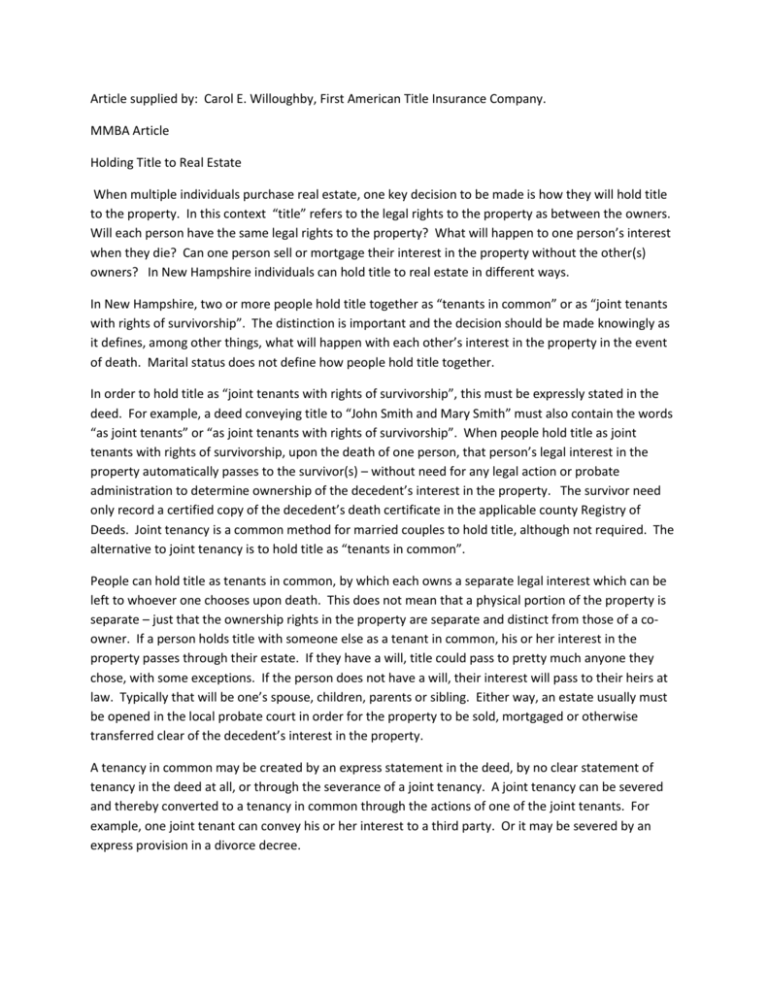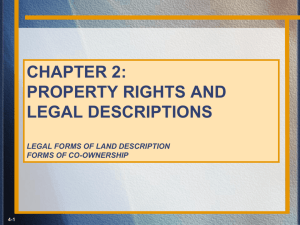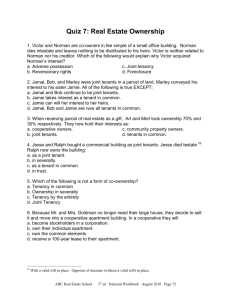Holding title to real estate - MBBA-NH
advertisement

Article supplied by: Carol E. Willoughby, First American Title Insurance Company. MMBA Article Holding Title to Real Estate When multiple individuals purchase real estate, one key decision to be made is how they will hold title to the property. In this context “title” refers to the legal rights to the property as between the owners. Will each person have the same legal rights to the property? What will happen to one person’s interest when they die? Can one person sell or mortgage their interest in the property without the other(s) owners? In New Hampshire individuals can hold title to real estate in different ways. In New Hampshire, two or more people hold title together as “tenants in common” or as “joint tenants with rights of survivorship”. The distinction is important and the decision should be made knowingly as it defines, among other things, what will happen with each other’s interest in the property in the event of death. Marital status does not define how people hold title together. In order to hold title as “joint tenants with rights of survivorship”, this must be expressly stated in the deed. For example, a deed conveying title to “John Smith and Mary Smith” must also contain the words “as joint tenants” or “as joint tenants with rights of survivorship”. When people hold title as joint tenants with rights of survivorship, upon the death of one person, that person’s legal interest in the property automatically passes to the survivor(s) – without need for any legal action or probate administration to determine ownership of the decedent’s interest in the property. The survivor need only record a certified copy of the decedent’s death certificate in the applicable county Registry of Deeds. Joint tenancy is a common method for married couples to hold title, although not required. The alternative to joint tenancy is to hold title as “tenants in common”. People can hold title as tenants in common, by which each owns a separate legal interest which can be left to whoever one chooses upon death. This does not mean that a physical portion of the property is separate – just that the ownership rights in the property are separate and distinct from those of a coowner. If a person holds title with someone else as a tenant in common, his or her interest in the property passes through their estate. If they have a will, title could pass to pretty much anyone they chose, with some exceptions. If the person does not have a will, their interest will pass to their heirs at law. Typically that will be one’s spouse, children, parents or sibling. Either way, an estate usually must be opened in the local probate court in order for the property to be sold, mortgaged or otherwise transferred clear of the decedent’s interest in the property. A tenancy in common may be created by an express statement in the deed, by no clear statement of tenancy in the deed at all, or through the severance of a joint tenancy. A joint tenancy can be severed and thereby converted to a tenancy in common through the actions of one of the joint tenants. For example, one joint tenant can convey his or her interest to a third party. Or it may be severed by an express provision in a divorce decree. Another way that individuals commonly hold title is in trust. In this way, the trustee holds title to the property for the benefit of others, as spelled out in a trust document. This is a common method of holding title to real estate for people that have created an estate plan. By holding title in trust, the parties can typically avoid the filing of an estate proceeding in court upon the death of a trustee or beneficiary. In addition, they can fully utilize the federal tax code rules to minimize tax liability and maximize the value of one’s estate that passes to survivors. The development of a trust document should be done with the assistance of a qualified attorney as there are a variety of legal and family issues that must be addressed. Another question that frequently arises for individuals owning real estate has to do with changes of name, through marriage, divorce, or other legal proceeding. For example, if I purchase real estate with my fiancé in my maiden name, and then get married and change my name, there is no legal requirement that the title be changed to reflect my name change. In future transaction I can refer to myself by my new name, formerly known as my old name. If, however, I wish to update the title to reflect my new name I can do so via a deed with my spouse using the same method of tying the two names together on record. It is a good idea to enlist the services of a real estate attorney for this task, so to preserve or alter the manner in which I and my spouse hold title. This information has been provided by the Mortgage Bankers and Brokers Association of New Hampshire (MBBS_NH) in conjunction with the New Hampshire Union Leader. Any questions about the content should be directed to the MBBA-NH at 6 Garvins Falls Road, Suite 106, Concord, NH 03301, email at info@mbba-nh.org, website mbba-nh.org. Article supplied by: Carol E. Willoughby, First American Title Insurance Company.











